- Home
- Antonia Fraser
Political Death Page 16
Political Death Read online
Page 16
“Your seat. Let’s see, what shall we do with it? Whom shall we reward? Some nice, loyal chap who will just have lost his own seat. For example, I also hear that Harry Carter-Fox can’t possibly hold Bedford Park.”
“The Carthorse!” exclaimed Burgo. “For God’s sake. That we should be so lucky as to lose him. If the electorate get rid of him, every committee he’s on will take half the time.” (Had Olga Carter-Fox heard this, she might have revised her opinion of Burgo Smyth, at any rate as a future protector of her husband.) Burgo’s response was automatic. He had forgotten for the time being the Swain connection, as the politician in him became once more dominant. Yet he had spoken to Olga Carter-Fox only recently, as he felt in honour bound to do, following the discovery at Hippodrome Square: that sulky brooding Olga Swain whom he had never liked even when she was a child.
“Oh, I should rather miss him!” cried the Prime Minister. “No one can accuse us of being a party without a conscience with him on our backbenches. Conscience, yes, yes. What a nuisance consciences are, aren’t they? But some people have to have them, don’t they? Otherwise where should we be? No, we can’t afford to ignore the conscience factor, can we? Under the circumstances.”
Throughout this light-hearted tirade, the Prime Minister had continued to walk about, occasionally peering out of the deep windows at the various structures of the British Establishment which the views provided. Burgo Smyth realised that he had always been maddened by H.G.’s apparent inability to keep still, never more so than now. But of course, like so much of seeming inconsequence about Horace Granville, this habit of peregrination served its purpose. In this case, his restlessness protected him from direct eye contact with Burgo Smyth, as he pronounced the exact steps by which his political execution was to be carried out.
The death was to be self-inflicted. Like a kamikaze pilot in the service of the Japanese emperor at the end of World War II, he was expected to commit a form of suicide. Burgo Smyth knew that; he accepted that; he had in a conscious or unconscious sense been expecting this moment for almost the whole of his effective political career. He still paused to wonder at the cold-blooded cunning of Horace Granville who would accept the sacrifice of his safe seat, at one and the same time as stopping the mouth of the late Imogen Swain’s family by promising it to her son-in-law.
When Burgo replied, he did so with great formality. “I’ll do whatever you say, Prime Minister. I began this meeting by apologising for all the distress I am giving and shall be giving to the cause we both serve. I should like to end it by apologising again. To you personally. You have shown many kindnesses in the past—both to me and to my wife.” Burgo Smyth stood up, towering heavily over the slight dapper figure of the Prime Minister; he prepared to extend his hand. But, like an eel, H.G. slipped away from the closeness and in an instant was to be seen at the drinks tray, pouring from a cut-glass decanter full of pale gold-coloured liquid.
“Malt whisky. Local. Made in my constituency. But of course my sister always insists we pay for it and it costs a fortune.” He handed Burgo Smyth a beautiful and weighty tumbler. The Prime Minister sipped. The Foreign Secretary took something not far from a swig. On doctor’s orders, he had not drunk whisky or any other spirits for a long time; as he tasted the elixir, he decided that whatever his future held, it was going to feature whisky once again. Suddenly, to Burgo Smyth’s astonishment, H.G. put down his glass and, stepping towards him, put his arm around his shoulders, reaching up slightly to do so. He’s going to hug me, thought Burgo Smyth, he’s really going to hug me.
“My dear Burgo, I’m so terribly, terribly sorry,” said Horace Granville gently. For once in his life he sounded absolutely serious. “I keep thinking how for thirty years you must have dreaded this moment. The anguish you must have felt. Following the—accident, how you must have longed to put the clock back.”
For the first time since that midnight encounter with his children and Jemima Shore, Burgo Smyth felt his self-control faltering, that iron self-control on which (like Mrs. Patel the cleaner) he had prided himself throughout his career. By this time the Prime Minister had delicately stepped back, and his glass was once more ensconced in his hand. Burgo’s voice when he answered was unusually husky, but he managed a kind of smile.
“Putting the clock back! Yes indeed. Don’t we politicians always wish we could do that?”
“You must have felt great love.” H.G. sounded almost wistful.
“I felt great passion. Not always the same thing.”
“Ah yes, you’re probably right. I wouldn’t know about that. Or so my sister tells me. Passion, I mean, not love. I tell her I would be perfectly capable of feeling passion if only the right woman came along. It would serve her right if I did fall violently in love, at my age, and insisted on getting married. Then where would she be?” The frivolous mask was back.
“Thus putting the clock back, Prime Minister?” murmured the Foreign Secretary in the same vein. He took another long drink of the magic pale liquid in his heavy tumbler.
CHAPTER 14
AT THE CENTRE OF THE WEB
Olga Carter-Fox contemplated the woman she had once known as Nanny Forrester. Her first reaction was surprise at how spry her former nurse was: not yet an old woman, although she remembered her thirty years ago as a middle-aged gorgon. But the former Nanny Forrester was gone; she was now apparently to be called Glenys.
“Since we are more like friends!” said Miss Glenys Forrester with a little laugh. She poured Olga a second cup of coffee out of a bone-china coffee-pot, painted with tiny roses and forget-me-nots. A plate containing sugary biscuits matched exactly and so did the cups, with handles so spindly it was difficult to hold them.
Then Miss Forrester twinkled even more archly. “Especially as I’m going to be able to vote for Mr. Carter-Fox on Thursday. What a surprise to find I was in your constituency after all these years! At the time I just couldn’t help dropping Mr. Carter-Fox a wee note, reminding him of the connection, and a card for you. Then of course there was my problem with the Town Hall, everyone there is so dreadfully left wing. Mr. Carter-Fox did what he could, but I suppose I had hoped for some tiny personal touch from you, Olga …”
She rattled on in what was a parody of amiability, just as Olga remembered her: “Still you must have so many responsibilities. Just one little girl, Elfrida, isn’t it? I loved the photo—more like Lady Imogen, I thought, than you. The eyes, anyway. But isn’t it terrible when they lose their teeth and they will smile to the camera? I bet you and Mr. Carter-Fox had a good laugh about that photograph.”
Then Glenys Forrester returned to the subject of their new friendship. “Certainly, I don’t expect you to call me Nanny any longer. I haven’t been called Nanny since I left you. In my next post I was called Glenys. Mrs. Arkwright considered Nanny to be quite old-fashioned. And later I called the Arkwrights themselves, Jack and Josephine Arkwright, you know, the Arkwright Foundation, they do so much for charity, I was asked to call them Jack and Josephine. Wasn’t that surprising?”
Olga wanted to say, “Since those were their names, it would have been surprising if they had asked you to call them anything else.” But she bit back the childish impulse. She was here, in this horrible, stuffy, over-furnished West London flat, drinking weak milky coffee and eating sweet biscuits, only because she was desperate. Nevertheless, Olga was reminded how much she had always disliked the late Nanny Forrester, now her friend Glenys. Fortunately, it seemed the dislike had not been mutual.
“Of course Olga, you were always my little pet.” Glenys Forrester spoke in a sentimental voice which Olga also remembered from the past, in those days applied to kittens in baskets, baa-lambs with blue bows, and flower fairies. “That’s what I told the Arkwright boys, and all my other families. Olga Swain was quite the best behaved little girl I ever looked after. Not that deep down you didn’t have a temper—your little black clouds we used to call them—but your manners were a joy. Millie was quite another matter. What a little
liar! As I always told your mother.
“And how is she?” Glenys Forrester hardly varied her cosy tone. “Of course I don’t believe all I read in the newspapers.” She pursed her lips. “But really, some of the things she says in public! And badgering our poor Prime Minister all the time. As if he didn’t have better things to do.”
Then a curiously avid expression crossed Glenys Forrester’s face. “So what’s he like?” she added.
Olga was startled. “H.G.? Very good manners. As you would expect.” It seemed an appropriate thing to say to a former Nanny.
“No, no, not the Prime Minister. Randall Birley. Does he come to your dinner parties? I watched Rebecca, I wouldn’t move from the set. I told my friends, now just don’t telephone me on Sunday nights …”
But Olga Carter-Fox had not dug out Nanny Forrester’s change-of-address card (hitherto purposefully ignored by her) to talk about Randall Birley. She thought it best to come right out with what she did want. “Nan—Glenys. Something extraordinary, something horrible has happened. How can I put this? I’m afraid it will be a great shock to you. It was a great shock to me. It’s to do with the old days at Hippodrome Square. It’s to do with the house itself.”
“The house—” It was Glenys Forrester’s turn to look startled. She put down the delicate coffee cup she had been endlessly sipping. Olga knew that she would be even more astonished at what was coming next—astonished, and no doubt legitimately horrified. Olga had to press on while she still had the advantage of surprise.
“Glenys, I wonder whether you would talk to someone about the old days, and how you left us so suddenly. The fact is that I have someone with me, someone outside, Jemima Shore, you know, from television, Jemima Shore Investigator.”
“Here? Television cameras here, oh Olga, what on earth, I don’t understand, an interview—” Glenys Forrester touched her hair. “I must make some more coffee.” You could almost have said she bridled. The hair style had smartened up since Olga’s childhood and there was evidence of a blue rinse.
“Not actually on television,” Olga explained patiently. “You see, Jemima Shore’s helping us, Harry and me.” Olga judged it better not to mention Millie. “This is all absolutely confidential.” And there was another thing Olga judged it better not to mention to Glenys Forrester: she was fairly sure the former Nanny would end up having to talk to the police.
But she, Olga, could fight this thing better—this thing, whatever you called it, this scandal—she could tight it better if she at least knew the facts, the ancient facts. She could hardly persuade Nanny Forrester to trim her story. That would be quite wrong, against the law, no doubt. Olga was conscious of her responsibilities as an MP’s wife. Nevertheless, forewarned was forearmed, and there was nothing wrong with probing the mind of her former Nanny. As Glenys Forrester, excited as well as mystified, agreed to talk to Jemima Shore, Olga Carter-Fox blessed the magic persuasive powers of television.
Glenys Forrester did not scream or faint or do anything dramatic when Jemima Shore broke the news that a skeleton had been discovered in the cellar of Hippodrome Square. Jemima referred as euphemistically as possible to “an accidental death,” and an equally accidental discovery. She did not try to cover up Lady Imogen Swain’s involvement, but she simply did not mention any other names. At first Miss Forrester said nothing at all, merely pursing her lips again into that narrow line which reminded Olga vividly of the tyrant of the Hippodrome Square nursery. Then she flushed visibly beneath her pale powdery skin, but it was not until Glenys Forrester spoke that Jemima and Olga realised she was not so much shocked as intensely angry.
“That wicked selfish woman! I’m sorry, Olga, but your mother was one of the most selfish mothers I ever had the ill fortune to work for, never a thought for anyone else, no consideration whatsoever. And a wicked temper when no one was looking. That’s where you got your little black moods from. Sweetness and light to her friends, but very different where the nursery was concerned.” Miss Forrester paused for breath, then returned to the attack as the full enormity of what she had heard struck her.
“How dared she do that? With decent people and little children in the house?” The angry flush deepened. “So that’s why—everything locked up and sealed off. No one allowed in the cellars, some talk about damp, flooding, all lies of course. And the smell of paint! The smell of paint everywhere! It made me feel quite ill, and my poor little girls too. Why was there so much paint? She had the whole hall and dining-room repainted after one year, after all the trouble she’d taken with the previous colour, endless coats and varnishes. Now we had all the pots all over again, the smell of paint everywhere, and she never made a fuss, she, Lady Imogen, who was always so fastidious about smell, about anything like that.”
Jemima Shore thought about those baffling open tins of paint the old dried paint sloshed about in the outer cellar. She could imagine no better mask for some more sinister odour than the smell of fresh paint … nor apparently could Lady Imogen Swain. She must have done that herself if Burgo Smyth never visited the house again. His idea, her idea? Since Smyth had not mentioned it, possibly her idea, the brilliant notion of a woman whose great interest in life in those days, judging from her Diary, had been interior decoration—apart from parties and of course sex.
Glenys Forrester was now in full flood: “And when I started to ask questions—well, naturally I did, I had my little girls to look after—just like that, three months’ pay instead of notice. And off I was asked to go. The girls were heartbroken.” Miss Forrester stared at Olga as though daring her to contradict her. “I knew it was all wrong. But of course I thought it was all about … other things, never mind.”
“It’s a long time ago,” Jemima said gently. “What other things?”
“If Olga doesn’t mind—no, why should you? As Jemima says, it’s all a long time ago. Lady Imogen’s behaviour, I should call it. A married man too! With such a nice wife. I sometimes saw poor Mrs. Smyth at children’s parties. Naturally, I never said anything, I was just specially nice to the twins. And how well they’ve turned out, haven’t they? Archie Smyth, a proper young Englishman, not enough people like that now in the Conservative Party—”
“So you knew all about it? Lady Imogen’s affair. And that was why you thought she asked you to leave.” It was the persistently gentle but relentless voice of Jemima Shore Investigator.
“Of course I knew all about it,” Miss Forrester retorted. She added witheringly, “You can’t keep things like that from a Nanny, you know.” Jemima Shore had absolutely no difficulty in believing that. “Even though I was on my nursery floor,” Glenys Forrester continued, “and never let my little ladies go where they weren’t wanted.”
“I understand.” Jemima’s response was deliberately warm. “But a death in the house—I take it you wouldn’t have known anything about that at the time? Beyond being surprised at the fresh paint.”
“No, no, not a death, God save us!” Miss Forrester gave an artistic shudder. “But I knew there was something fishy, very fishy in that house. The way I was asked to leave so suddenly. It was all wrong. My instinct told me that. A Nanny’s instinct is never wrong.”
“Now, do you remember someone called Franklyn Faber coming to the house?”
Miss Forrester frowned. “The name is familiar. Why is it familiar?” Jemima did not enlighten her. “But no, I don’t remember him, and I should say that we didn’t have people like journalists coming to the house. Lords and ladies were more likely. And you may say where Lady Imogen was concerned, more lords than ladies.” The prurient note was back.
Jemima drove Olga Carter-Fox away from the depressing red brick house, built at the turn of the century, where Miss Forrester had her flat. She put on a tape of Jessye Norman and Kathleen Battle singing a negro spiritual, to eliminate the need for conversation.
Olga was silent, staring ahead. As they approached Shepherd’s Avenue, Olga said, “Stop the car. I’ve something to tell you. I can’t say it in fron
t of Elfi. It’s way after four o’clock. The au pair will have fetched her from school.”
Jemima switched off the glorious voices.
“I’ve learned something from visiting that ghastly woman. To think she was put in ‘sole charge’ of us, as they used to call it, dreadful phrase but accurate where my mother was concerned. Be that as it may … this is something about that night. The night he must have died. Something I knew all along but didn’t know I knew it.”
Olga looked at Jemima for the first time. She appeared to be extraordinarily tense and her dark eyes had that fierce expression which Jemima had noticed on their first meeting in the Irving Theatre. “Jemima, my sister Millie went downstairs that evening. I think it must have been that evening. She saw something. It’s nonsense what Nanny Forrester said about our never going downstairs. That’s what brought it back to me. Everyone tells lies. Including Nanny Forrester. She used to go to bed, in her own room, with the door open, and snore like an elephant. A sherry or two probably helped. She slept like a log; you could hear her a mile off. And then we used to go downstairs, something we were strictly forbidden to do. Which made it an adventure.”
Olga sighed. “How pathetic! When I think of Elfi, downstairs every night and we love to see her. Well, mostly we love to see her.” Olga smiled. “But for us, Millie and me, to go downstairs and spy on our mother was a great adventure.”
“What did Millie see? And how did you know?”
“Millie saw something: Madre and a man. I suppose it must have been Burgo. Millie adored Burgo. Several times Millie and I saw Burgo and Madre kissing. We thought it was horrid—sucking noises—we had to try not to giggle. Once he put his hand—well, you can imagine. We thought that was rude. At the same time Millie still loved Burgo. But that night it was different. I don’t quite know what Millie saw. ‘The man fell down. And Madre was angry.’ I remember that Millie was very frightened.

 Warrior Queens
Warrior Queens The Gunpowder Plot
The Gunpowder Plot Cromwell
Cromwell The Weaker Vessel: Women's Lot in Seventeenth-Century England
The Weaker Vessel: Women's Lot in Seventeenth-Century England Marie Antoinette: The Journey
Marie Antoinette: The Journey Oxford Blood
Oxford Blood Your Royal Hostage
Your Royal Hostage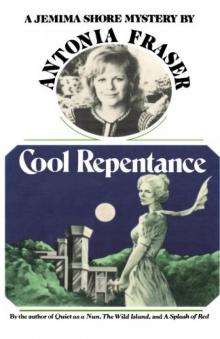 Cool Repentance
Cool Repentance Mary Queen of Scots
Mary Queen of Scots Political Death
Political Death Royal Charles: Charles II and the Restoration
Royal Charles: Charles II and the Restoration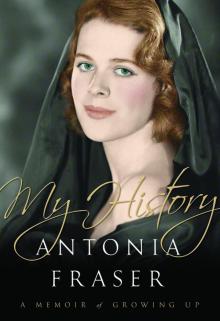 My History: A Memoir of Growing Up
My History: A Memoir of Growing Up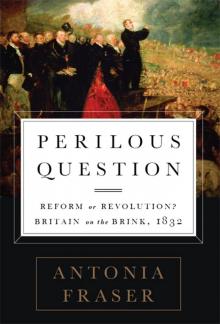 Perilous Question: Reform or Revolution? Britain on the Brink, 1832
Perilous Question: Reform or Revolution? Britain on the Brink, 1832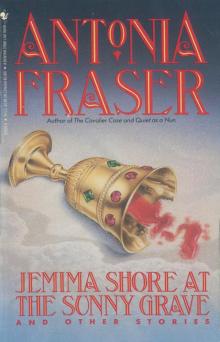 Jemima Shore at the Sunny Grave
Jemima Shore at the Sunny Grave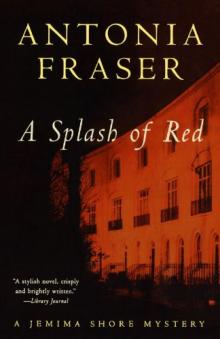 A Splash of Red
A Splash of Red Must You Go?: My Life With Harold Pinter
Must You Go?: My Life With Harold Pinter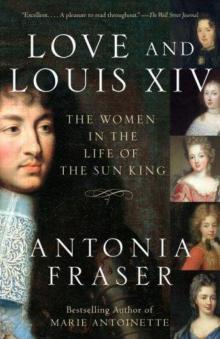 Love and Louis XIV: The Women in the Life of the Sun King
Love and Louis XIV: The Women in the Life of the Sun King The Warrior Queens
The Warrior Queens The Wild Island
The Wild Island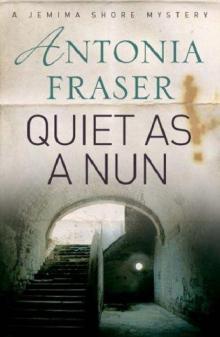 Quiet as a Nun
Quiet as a Nun Perilous Question
Perilous Question Cromwell, the Lord Protector
Cromwell, the Lord Protector Gunpowder Plots
Gunpowder Plots The Wild Island - Jemima Shore 02
The Wild Island - Jemima Shore 02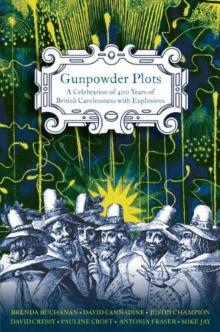 Gunpowder Plots: A Celebration of 400 Years of Bonfire Night
Gunpowder Plots: A Celebration of 400 Years of Bonfire Night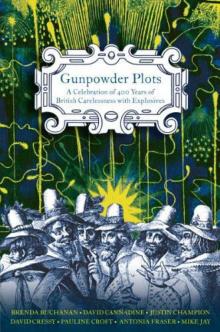 Gunpowder Plots_A Celebration of 400 Years of Bonfire Night
Gunpowder Plots_A Celebration of 400 Years of Bonfire Night Marie Antoinette
Marie Antoinette Must You Go?
Must You Go?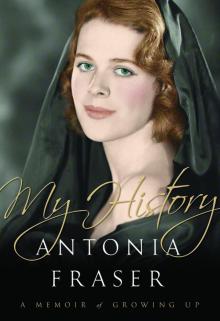 My History
My History